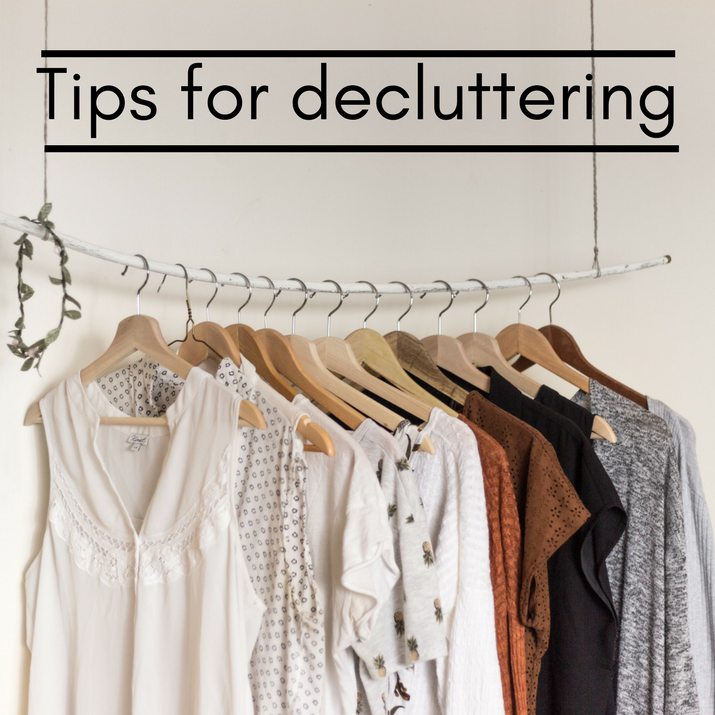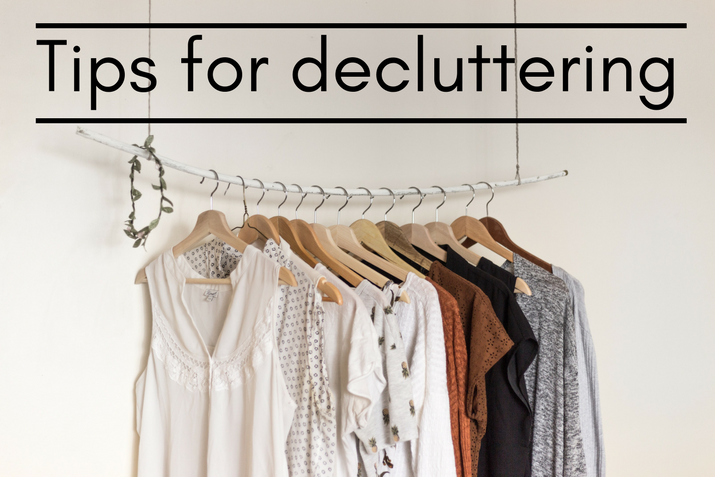I have written quite a bit on decluttering on the blog over the years, here are few of the most popular posts:
- Why decluttering is important – There is a difference between tidying and decluttering. Decluttering doesn’t mean your house has to be in perfect order or the kids have only a couple of toys, it means you move from the house items that are not needed and free up space and time.
- Tips for decluttering your home – packed with ideas and inspiration on how to rid your home of clutter room by room.
- What to do when decluttering has stalled – it can be hard to stay on the decluttering wagon when it feels like a tsunami of stuff coming in the house. In this post I share strategies you can use to reignite your decluttering mojo.
These decluttering tips all focus on dealing with the stuff once it is in the house. Over the last couple of years while I am still keen to declutter, I am also significantly more conscious of what I actually bring into the house. The more I bring in, the more I will have to declutter at a later time.
Here are some ideas on how to bring less clutter into the house in the first place:
24 hour cool off period
I am making very few unplanned purchases now. I have learnt that often when I buy things because they are on sale, or I purchase them on a whim, they aren’t always great purchases. Often they have indeed led to buyer’s remorse or it is something that I end up using rarely.
In terms of clothes, I only buy now when I know exactly it is that I want – e.g. a white t-shrit or a black jumper. This makes sure that I am not impulse buying, thinking that I am “saving” because it is on sale.
If I am out and about or I see something online that I truly love and feel it would be a positive purchase, I will give myself 24 hours before I make the purchase. Sometimes I do this knowing that the item may then be sold and I won’t be able to purchase it, but I figure if that happens then I wasn’t meant to have it!
1 in 1 out
My husband loves this rule and it is under his example that I follow this rule. This works incredibly well for me because I can find letting go of some things quite hard. Before buying the item I have to think about what similar item am I prepared to let go of so I can bring the new one into the house. Many times this has seen me put items back on the shelf in a shop!
Can I borrow the item?
Sometimes we need items for a one off use or if we have a special occasion coming out we want to wear something new. I happily borrow dresses from girlfriends so that I can have the feeling of wearing something new, without the cost or clutter of a new purchase. Likewise I happily lend my dresses to friends too.
We also have fabulous neighbours and between us we have a great range of power and gardening tools that we swap as needed. So before running out to buy an item straight away, I like to think if this an item that I would be better off borrowing.
How often will I use it?
There are so many single purpose specific items available now. They look fantastic and they may save a small amount of time, for the one time in the month that I might use it. We have had items like this come into the house either as gifts or I have bought them on a whim.
Single purpose items like ice-cream makers, waffle makers, food spiralizers, I have ended up giving away to friends because the space they took up out weighed their usefulness as they were rarely used. For some people they may use these items on a daily/weekly basis so rightly take up space which is why it is so important that I ask myself how often will I use it? Just because someone else uses it doesn’t mean I will.
Does the item solve a problem?
When I am buying non perishable and non clothing items, I like to ask myself if the item I want to purchase is going to solve a problem. For most items coming into the house, I want them to be useful and make life easier. There are some items that I will buy for pure joy, but they are very few. Asking myself what problem does the item solve is a useful guide as to whether or not I really need to make the purchase.
Are you struggling with decluttering? Let me know below and I will add some thoughts that might help you get started!
| Habit | Connection to goal - Detach from the old and embrace the new to nurture a family spirit of adventure. | Poem quote | Feburary Review |
|---|---|---|---|
| Practice detachment daily | My attachment comes from the right place in terms of wanting the best for my family and myself, but it can be founded on beliefs that I hold that are not necessarily true or helpful. Letting go of this belief and creating a new one requires me to detach. Detaching doesn't mean I stop caring or give up but it means I acknowledge it, explore it, process it, take action to move on and let it go. Letting go of old or untrue beliefs will mean I can focus on being more supporting and encouraging to the kids. | "For us, there is only the trying. The rest is not our business." ~ T.S. Eliot | Practicing detachment daily is just that for me - practice! It has made me realise that I do hold on to things too much and yes I can hold a grudge even if it is for a short time. Being a practice it means that even when I don't manage to let go and detach myself, I don't feel like a failure. I actually feel okay because each time I realise that I have not detached I can see it is a little victory. Previously I wouldn't even had realised I had not detached. While lots of room to go, I feel like I have made significant progress this month which makes me happy. |
| Develop the practice of mindful listening | Sometimes listening can be hard. I think I know what the kids or others are going to say, I have things on my mind, I have something I want to say or I have things I would rather be doing than listening then and there. Mindfully listening to others shows that you value them and it empowers them to share exactly how they are feeling. I want my kids to tell me about their dreams, their hopes, their fears and their crazy ideas. This won’t happen if I am not really listening. | “We do not believe in ourselves until someone reveals that deep inside us something is valuable, worth listening to, worthy of our trust, sacred to our touch. Once we believe in ourselves we can risk curiosity, wonder, spontaneous delight or any experience that reveals the human spirit.” ~ E.E. Cummings | I realise I need some solid strategies to help me with this. So towards the end of this month I focused on making sure I do not interrupt when others are talking and to leave space once someone has finished talking before I jump in. This is helping me to focus more on what people are saying and not what I intend to say next. |
| Do something new each month with the family | I love routine and being organised and sometimes I will take the option to spend time on these activities and not leave enough time for exploring something new. This year I want to try some big and little adventures with the family. | "Dust if you must, but there’s not much time, With rivers to swim, and mountains to climb; Music to hear, and books to read; Friends to cherish, and life to lead." ~Rose Milligan | It was a Spartan Race adventure this month! We had a great time and as someone who competes in these and other running events generally on my own, I loved having my family to see and hug at the finish line. |
| Use deliberate daily practice to learn something new each month | K. Anders Ericsson, a professor of Psychology at Florida State University, is a pioneer in researching deliberate practice. One of his core findings is that becoming an expert at a skill has more to do with how you practice rather than with just performing the skill many times. To really embrace a new skill I need to intentionally practice, not just do the skill to tick the box to say I have done it. This is a practice I really want to develop and role model for my kids. | "Submit to a daily practice. Your loyalty to that is a ring on the door. Keep knocking, and the joy inside will eventually open a window and look out to see who’s there." ~Rumi | It is amazing how we can do something like drive a car but not really think about it. We have had our small second car for a couple of years and until my husband explained to me at the start of this year that one of the numbers which appeared on the dashboard related to fuel economy. We had a chat about how that it was generally my time in the car that made the fuel economy worse. This is partly due to the short drives I take in busy traffic, but partly also due to me being a bit to hard on the accelerator (not speeding but going from 0-60 quickly for example). I decided to use deliberate practice to improve this. I now think much more about how I drive as opposed to getting in the car and thinking about 100 other things. I check in on the measurement regularly for feedback and correct my actions as required. It has made significant difference to the numbers and it was an excellent exercise for to see that you can do something without intention and get from a to b but to do it better you need to think more about what you do. |
| Develop a monthly decluttering habit | Our house is relatively uncluttered but we really do have too much stuff. All this extra stuff takes up space, time and energy - all of which I can reclaim and redirect when I declutter. | "The open space surrounding me Clears my lungs Makes me breath I feel light Alive Vividly bright and empty A room to dance in happily" ~Anna Elise | Major spots decluttered this month were the main book shelf and the kitchen cupboards and drawers. |
Photo by Priscilla Du Preez on Unsplash


